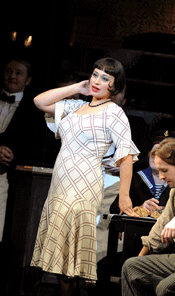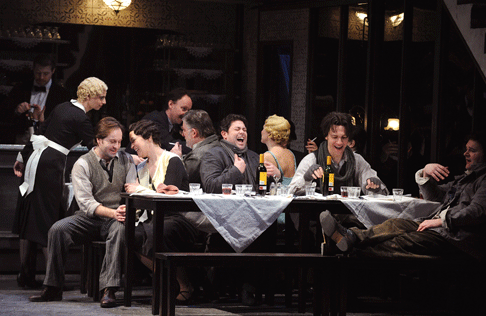As a staging, it has all the hallmarks of a future classic of the ENO repertoire. Isabella Bywater’s naturalistic set is as easy on the eye as Amanda Holden’s fluid new translation is on the ear, while Jean Kalman’s lighting handsomely sets off the wide attic windows and silhouetted rooftops. Fast-forward a couple of seasons to an above-average revival; the rough edges of the staging will have been smoothed over, the perfect cast will be engaged, and everything will ‘click’. The previous production - which was less distinctive than this - was memorable thanks to a succession of lively and well-matched ensembles of soloists.
That, alas, was what this new production lacked. As Mimì, the sweet but pallid soprano of the American soprano Melody Moore lacked warmth and passion; Alfie Boe was a fine Rodolfo a few years ago at Glyndebourne, but that’s a much smaller house, and his is not a large voice - he was frequently swallowed up by the orchestral texture. But a much greater problem was their credibility as a couple, with almost no chemistry between them. Admittedly the costumes were unhelpful: Moore has youth on her side, but a dowdy wig and unflattering dresses made her matronly and plain, not to mention improbably strong and healthy for a fragile heroine whose very identity is defined by a diminutive pet-name. In comparison to the small-framed Boe’s amiable and boyish Rodolfo, Moore’s Mimì seemed like a sensible elder sister.
 Hanan Alattar (Musetta)
Alfie Boe (Rodolfo)
Hanan Alattar (Musetta)
Alfie Boe (Rodolfo)
Musetta, Hanan Alattar, somehow failed to dominate Act 2, and her sharply focused soprano remained pert and hard-edged right up to the end, though her characterisation gained in warmth and was quite touching. Best among the soloists was the congenial, warm-voiced Roland Wood as Marcello, and Pauls Putninš’ distinctive bass brought considerable pathos to Colline.
The set - with buildings that revolve into various configurations to create the various locations - evokes a down-at-heel 1930s Paris. Appropriately, the garret scenes take place on an upper level, which caused a few acoustic issues from where I was sitting in the Stalls. The cast were sometimes overwhelmed by the orchestra, particularly in the fast-moving banter of Act 1. It wasn’t until Act 3, when the soloists are at ground level and not lost in the ensemble, that the vocal projection was really satisfactory. The split level creates a dramatic issue too, with the staircase up to the Bohemians’ doorway forming the focal point of the set: none of the entrances are a surprise, from Benoit’s in Act 1 to Musetta’s in Act 4. The sole purpose of its central placement seems to be to throw focus on Schaunard (David Stout) towards the end as he leaves Rodolfo and Mimì alone.
 Alfie Boe (Rodolfo), Melody Moore (Mimì), David Stout (Schaunard), Pauls Putnins (Colline), Roland Wood (Marcello)
Alfie Boe (Rodolfo), Melody Moore (Mimì), David Stout (Schaunard), Pauls Putnins (Colline), Roland Wood (Marcello)
In his house debut, conductor Miguel Harth-Bedoya gave a musically competent, lucid reading, but it was short on warmth and there was little sense of connection between pit and stage.
I mustn’t ignore the positives: Simon Butteriss’s sleazy Benoit was a highly entertaining cameo, and Act 3 was really well-staged, with well-directed cameos from members of the chorus and (finally) some believable emotional interplay between the two couples. But at the end of the evening, though I found myself sorry for Mimì’s death, I was quite indifferent to Rodolfo’s loss. If only I could have believed they were ever in love.
Ruth Elleson © 2009


